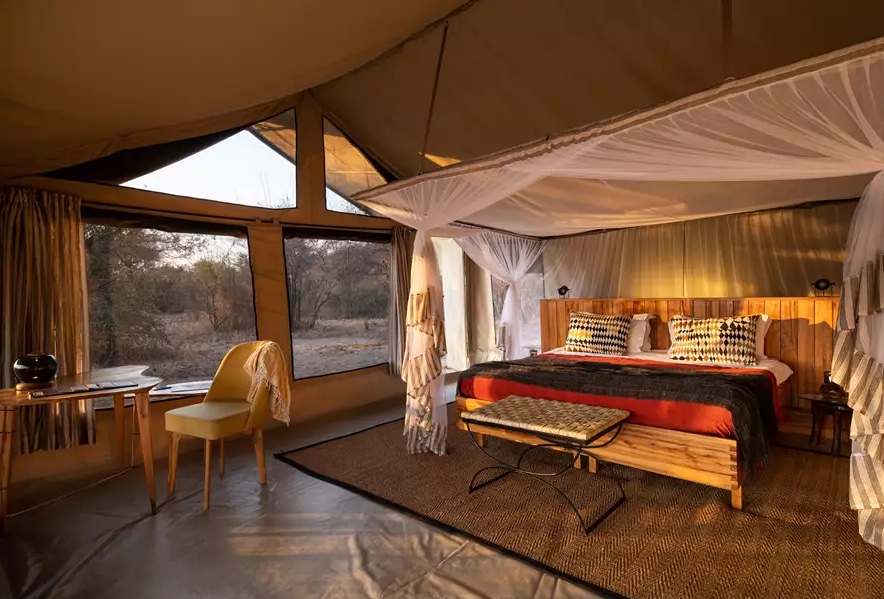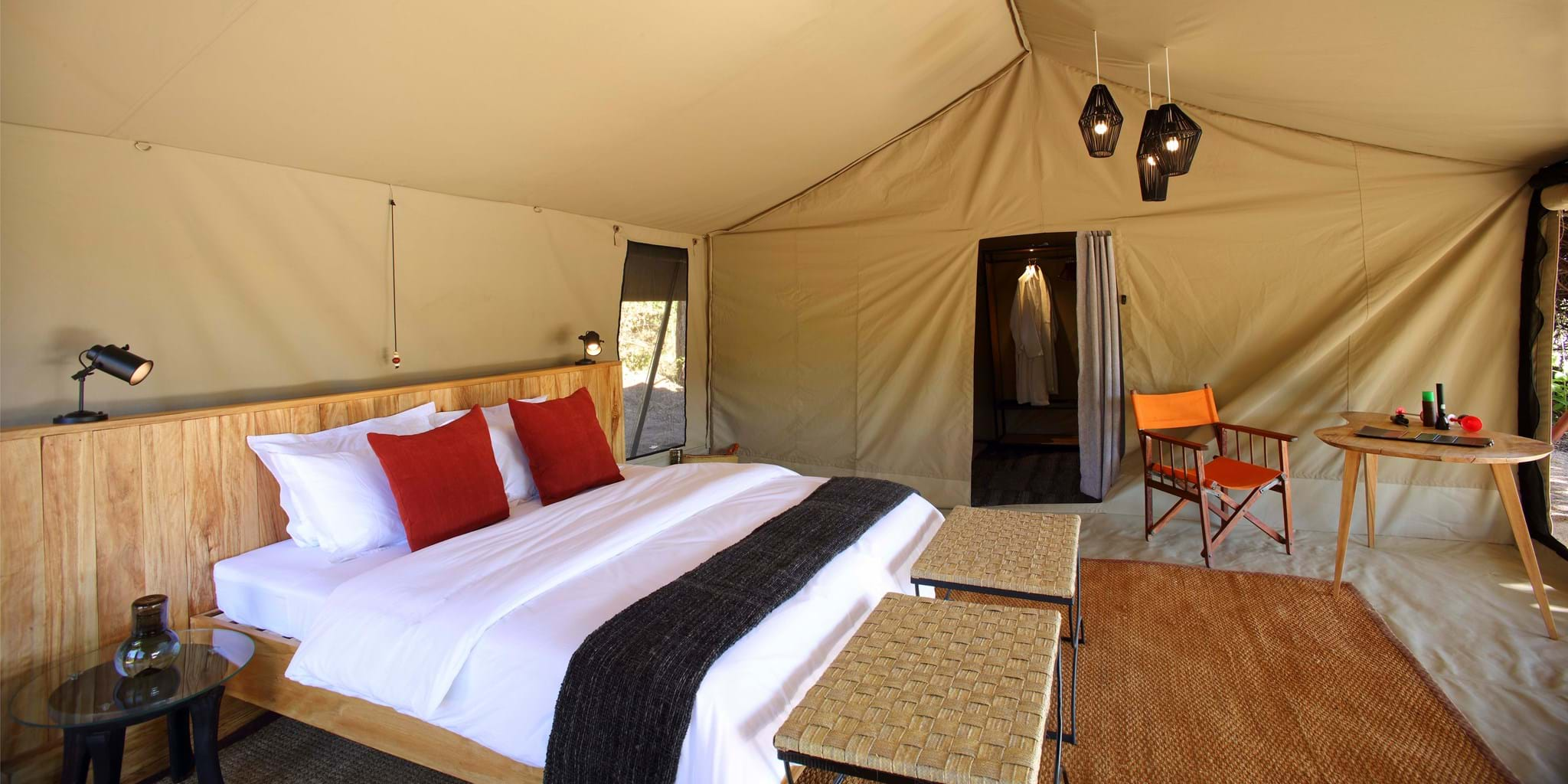Kwihala Camp is a tented site that encapsulates the essence of a traditional safari experience while maintaining a commitment to luxury. Nestled seamlessly into the natural surroundings in the vast Ruaha National Park, the camp boasts well-crafted structures adorned with natural-colored canvas, eschewing concrete or stone. The furnishings and fittings complement the environment elegantly, ensuring comfort without sacrificing the sense of being immersed in the wilderness.
Comprising six spacious, light-toned walk-in tents, Kwihala Camp features simple and practical furniture, including light wood beds adorned with mosquito net canopies, sisal and wrought iron luggage racks, and neutral-colored occasional chairs. Modern elements, such as metal spotlights, blend harmoniously with natural fabrics, while wooden doors replace traditional zips for ease of access. Each tent is equipped with a large makuti floor mat and a standing fan.
The en-suite bathroom is separated from the bedroom by a curtained doorway and features a large wooden plinth with two ceramic basins, mirrors, and complimentary toiletries. An open wardrobe provides hanging and shelf space, while separate cubicles house the shower and flush toilet with wooden floorboards. The safari shower, functioning like a standard shower, is supplied with 20 liters of warm water in the mornings, evenings, and upon request.
 Each tent boasts a small shaded veranda with wooden chairs and a side table, offering a tranquil spot to observe the surrounding bush and bird activity.
Each tent boasts a small shaded veranda with wooden chairs and a side table, offering a tranquil spot to observe the surrounding bush and bird activity.
The main lounge/dining area, housed in an open-sided tent facing the Mwagusi Riverbed, exudes functional comfort. Bare ground sheets along the edges of the vast makuti mat maintain a minimalist, natural style that seamlessly integrates with the wilderness setting. The area features a large canvas adorned with the iconic Kwihala baobab, inviting guests to relax with coffee table books or enjoy drinks from the bar.
Meals are served in the dining area within the main tent or on the shaded veranda, with a campfire area beyond for evening gatherings. Dinner is presented in the main tent or in the open, in front of the main area.
Kwihala’s exceptional guiding comes from highly trained and passionate guides with extensive wildlife experience in Ruaha and beyond. Activities primarily include morning and afternoon game drives in the game-rich areas around camp. Whole-day drives to more remote regions, such as the Jongomero area, are possible for longer stays. Night drives, featuring species like bat-eared fox and white-tailed mongoose, are included in the nightly rate with advance notice.
Walking safaris, unique to Kwihala in the park, provides access to various terrains, from the busier Ruaha River area to challenging walks leading to secluded parts inaccessible by vehicle. The camp’s intimate size, outstanding guiding, and diverse activities ensure a safari experience tailored to guests’ interests.
Kwihala Camp Location:
Kwihala Camp is located in the heart of Ruaha National Park; the largest national park in Tanzania, East Africa.
Recommended Duration of Stay:
We suggest a stay of three to four nights at Kwihala to allow ample time for a thorough exploration of Ruaha National Park.
Directions of Getting to Kwihala Camp:
The most convenient access to Kwihala is by flying into Ruaha from Dar es Salaam, Zanzibar, Selous Game Reserve, or northern Tanzania. Subsequently, guests can transfer to the camp via a safari vehicle. The approximately 3-hour light aircraft flight from Dar is followed by a 45-minute transfer from the airstrip to the camp, the duration of which may vary based on wildlife sightings along the route. For those opting for a road journey, Kwihala is approximately a nine-hour drive from Dar es Salaam, while the nearest town, Iringa, is approximately a three-hour drive away.
Accessibility:
Fly-and-Transfer
Special Interests:
Solo Travel
Kwihala is an excellent choice for solo travelers in Tanzania, offering exceptional walking and 4WD safaris led by expert guides. The camp fosters a social atmosphere with evening gatherings around the campfire and features low single supplements, ensuring an enjoyable experience for solo adventurers.
Birdwatching
With over 580 different bird species recorded in Ruaha National Park, Kwihala is an ideal destination for birdwatching in Tanzania. The period from mid-November to March is particularly rewarding for bird enthusiasts, and the knowledgeable guides enhance the experience. The woodland surrounding the camp attracts a variety of birds, making it an excellent spot to spot the purple-crested turaco.
Walking Safaris
Kwihala stands out as one of the best camps for walking safaris in Tanzania’s Ruaha National Park, offering experienced guides and a variety of walking routes that lead to areas inaccessible by road.
One of the best packages that you can take in Southern Tanzania while staying at Kwihala Camp is our 3-day fly in safari to Ruaha National Park.
Wildlife Safaris
Renowned for its untamed ambiance, Ruaha is an exceptional reserve, making Kwihala an excellent choice for wildlife safaris in Tanzania. The park is home to a diverse array of big game, including large herds of elephant and buffalo. Additionally, Ruaha boasts high numbers of lions and several endemic species, such as the Ruaha hornbill.
Children at Kwihala Camp:
Attitude Towards Children
Children aged five years and above are warmly welcomed at Kwihala.
Property’s Age Restrictions
Children aged between 5 and 18 are eligible for discounted prices. While there are no specific activities or services tailored for children, they can enjoy a discounted rate.
Generally Recommended for Children
As Kwihala lacks fences, allowing animals to roam freely through the camp, parental supervision is essential at all times. Due to the open and nature-focused setting, the camp is most suitable for older children.
Notes
Parents should be aware that children are their own responsibility throughout their stay.
Wildlife Sightings at Kwihala Camp:
Since mid-2018, our travelers who have stayed at Kwihala Camp have generously documented their wildlife sightings.
Abundant Sightings at Kwihala Camp:
The prevalent sightings include buffalo, elephant, giraffe, lion, zebra, and hippo.
Common Sightings:
Spotted hyena, eland, leopard
Rare Sightings:
Roan antelope, striped hyena, aardvark, cheetah, pangolin, sable antelope, wild dog.
Power Supply Information:
Kwihala is equipped with a backup generator.
Communications at Kwihal Camp:
For emergencies, the camp has a satellite phone, and there is generally good mobile reception. WiFi, suitable for handling emails, is available in the manager’s office.
TV & Radio:
Guest areas at Kwihala do not feature a TV. However, the staff has access to a TV, and guests are welcome to join them for sports events.
Water Supply – Borehole:
Water for washing purposes is pumped from the Mwagusi River.
Sustainability at Kwihala Camp:
Kwihala Camp’s Commitment to Sustainability:
Beyond being a haven for six comfortable tents set amid the wilderness of Ruaha National Park in Tanzania, providing tourists with diverse game drive and walking safari options, Kwihala Camp is deeply engaged in empowering local communities and environmental conservation. The camp is dedicated to addressing human-wildlife conflicts, a significant threat to large carnivores, including 10% of the world’s lion population.
The camp actively supports the Ruaha Carnivore Project, initiated as part of Oxford University’s Wildlife Conservation Research Unit. Kwihala contributes to projects such as the Community Camera Trap Programme, fostering a strong connection between wildlife and local communities. Trained locals are employed to monitor wild animals, and over the past nine years, the program has significantly reduced lion killings, employed 24 locals as camera-trap officers across 12 villages, and provided over US$145,000 in benefits to local communities, including healthcare supplies, veterinary medicines, and educational materials for 10 schools.
Health & Safety:
Malarial Protection Recommended: Yes
Medical Care:
All guides and managers are first-aid trained. First-aid equipment is available in camp and all vehicles. In case of emergencies, Kwihala is linked to the flying doctor service.
Dangerous Animals:
High Risk
Security Measures: Guests are escorted to and from their rooms at night, and airhorns in the tents are provided for emergency alerts. Night watchmen are on duty to monitor for animals.
Fire Safety: Extinguishers and sand buckets are located near all tents. Fire extinguishers are present in all Kwihala vehicles, and a firebreak surrounds the camp.
Activities available at Kwihala Camo, Ruaha National Park:
- 4WD Safari
- Birdwatching
- Guided Walking Safari
- Hot Air Ballooning
- Night Drive
Extras:
Disabled Access: On Request
Laundry Facilities:
A laundry service is included, but note that clothes are hand-washed, and delicate items may not be suitable. Underwear is not washed for cultural reasons. Washing powder is provided in the rooms for guests to hand-wash these items.
Money: Electronic safes are available in all guest tents. The camp prefers payment for extras in cash (US dollars, Tanzanian shillings, British pounds, or euros). Visa cards are accepted with a 5.5% surcharge, while travelers’ cheques are not accepted.
See yu soon at Kwihala Camp, Ruaha National Park!
Food & Beverage at Kwihala Camp
Standard Board Basis: Full Board & Activities
Food Quality:
Based on our visits in 2018 and 2019, the culinary offerings at Kwihala Camp are skillfully prepared, featuring abundant fresh fruits, vegetables, and salads. Meal timings are typically flexible to accommodate guests and the day’s activities. While dining is generally a communal affair, private dining can be arranged upon request.
Breakfast at Kwihala typically comprises a variety of fresh fruit, yogurt, pancakes, and a cooked breakfast. Guests embarking on early morning game drives receive a simple breakfast of fruits, muffins, cereals, and chapattis or bacon sandwiches in the bush, set up on the vehicle’s bonnet.
Lunch is usually served buffet-style, or if the camp has fewer guests, it may be served family-style. During our last visit, we relished tilapia fish, an array of salads, chips, delectable tartare sauce, and freshly baked garlic bread. A refreshing mango and passion fruit ice-capped off the meal, providing a welcome respite from the midday heat.
Dinner takes place either in the dining tent or, weather permitting, under the stars in the riverbed, illuminated by solar lamps and lanterns. The chef introduces the three-course meal before serving it at the table. Our experience included a crispy ochre salad, lamb curry in a poppadom basket with pilau rice and green beans for the main course, and a lemon posset for dessert. On another occasion, we indulged in a mixed grill.
During dinner, we were impressed by the waiter’s knowledge of wines, the selection of South African wines, and the intriguing local Tanzanian wine offerings.
Dining Style:
Group Meals
Dining Locations:
Indoor and Outdoor Dining
Additional Dining Information, Including Room Service:
While there is no traditional room service, guests can request tea and coffee delivery to their rooms. Private dining is an option for those who prefer it.
Inclusive Drinks:
Drinks, with the exception of Champagne (available at an additional cost), are included in the Kwihala experience. Filtered drinking water is readily available, and each guest receives a branded aluminum water bottle upon arrival—an excellent companion for keeping water cool during game drives.


Tour Reviews
There are no reviews yet.
Leave a Review